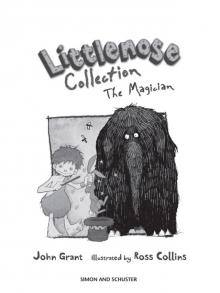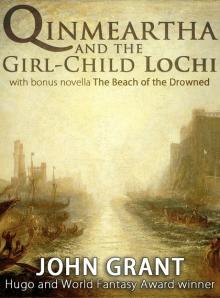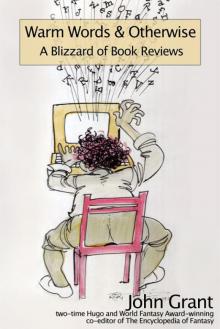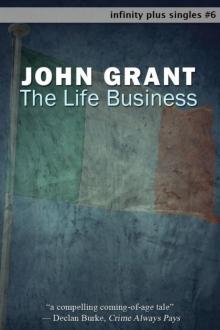- Home
- John Grant
The Life Business
The Life Business Read online
The Life Business
John Grant
infinity plus singles #6
Published by infinity plus at Smashwords
www.infinityplus.co.uk/books
Follow @ipebooks on Twitter
© John Grant 2010, 2011
Smashwords Edition, Licence Notes
This ebook is licensed for your personal enjoyment only. This ebook may not be re-sold or given away to other people. If you would like to share this book with another person, please purchase an additional copy for each recipient. If you’re reading this book and did not purchase it, or it was not purchased for your use only, then please return to Smashwords.com and purchase your own copy. Thank you for respecting the hard work of this author.
No portion of this book may be reproduced by any means, mechanical, electronic, or otherwise, without first obtaining the permission of the copyright holder.
This story was first published in Requiems for the Departed, edited by Gerard Brennan and Mike Stone (Morrigan Books, 2010).
The moral right of John Grant to be identified as the author of this work has been asserted by him in accordance with the UK Copyright, Designs and Patents Act of 1988.
Contents
The Life Business
More about infinity plus singles
The Life Business
"I live in a world made entirely of memories now," the ageing man says, adopting a solemn oratorical tone, regarding us earnestly from the other side of the gray plastic tabletop, a lunar terrain of coffee rings and carved initials and obscenities. "They're the landscapes and gardens among which I walk. They're my companions. I can throw sticks for them and call them to heel."
One of his pale blue eyes seems slightly larger, slightly looser than the other, and reacts more slowly to movements in the room. Its outer corner is full of tears, and I suspect is always that way. He must have had a stroke at some stage, although he walked normally enough when he came in. He's drooling a little, like an over-eager cat. Perhaps these signs aren't the aftermath of stroke but merely side-effects of his medications.
As I watch, a dribble of tear makes its jerky way down his grey-stubbled cheek to join the well of drool at the corner of his mouth.
It's the way we'll all be, eventually. He just got there sooner than most of us.
Martinmas told me I'd find the old man an interesting case. So far there's been little evidence to support that assessment.
"Tell us a memory," says Martinmas now, seated alongside me.
The older man shifts his gaze slightly to focus on Martinmas's face. "With a lady present?" He gives a slight inclination of his head to indicate me.
"She'll have heard worse," says Martinmas.
I join him in a small, professional chuckle.
"Even so. Even so. It wasn't her embarrassment I was thinking of. I'll not be telling you anything too juicy, then. Which is hard for me" – he clumsily parodies the apologetic – "because so much of my younger life was filled with juicy bits. I was a lad whose arse the ladies couldn't help but want to get their hands on, if you'll take my meaning."
I smile, again professionally. "There's nothing you can say that'll shock me." As soon as the words are out I hate the way I sound so prissy.
He holds my gaze in a long stare, then looks down at his knotty hands on the table in front of him. They're big hands. He was once a big man.
"Even so..." he repeats.
~
The first thing I noticed when the old khaki Army bus stopped at Magilligan Point was how the grass covering the uneven ground between here and the steely grey water of Lough Foyle was the same colour as the rusted corrugated iron of the roofs of the three long Nissen huts. Sixty teenaged boys, me one of them, would be spending the next two weeks in those huts, pretending to be soldiers by day and at night thinking about how maybe being at home wasn't that bad after all.
This was back in the mid-'sixties – must have been 'sixty-four or 'sixty-five, I'd be thinking. It was around the time my mum and my dad were having all the fights about the divorce they were planning to get. They'd separated a few months before; now they were wading into the legal stuff about who'd get the house and who'd get the car.
When the school cadet force put out the announcement that there'd be a field trip to the far side of the Irish Sea this summer, Mum had been one of the first parents to sign the forms.
My parents had already got me out from under their feet most of the time by sending me away to public school in Edinburgh – too far away for weekends home in Chelmsford. Now yet another sixteen days of uncomplication was theirs thanks to the good graces of the British Army.
And it was free.
Me? It was no skin off my nose to miss a few of their screaming matches. I was as glad to see less of my parents as they were to see less of me.
Once I got off the bus I noticed the second thing, other than the alien landscape, that was strange about this place whose name had had everybody on the bus doing Eccles and Bluebottle impressions ever since the ferry landed in Belfast.
It was the smell.
The air in the bus had been pretty full of the concentrated aroma of underwashed boys and incredibly hilarious farts, so I knew I shouldn't be complaining about the change to what now hit me in the face – and that was exactly what it felt like: being slapped across the face, not too hard, by a hand that was soft and quite small. A girl's hand. The shock came not from the strength of the blow but from its determination.
I was brought up by the sea, so I'm no stranger to what salty water and decaying seaweed and the occasional carcase of fish can conjure up between them, but this was something different. Away in the distance was the smooth surface of the lough, and beyond that the hills of Donegal loomed, an ancient purple against the sky's grey readiness to rain. The scorched-looking grass, kept tuftily short by as yet unseen wildlife or just by the hostility of the soil so close to the water, added to the sudden sensation I had that I could have stood here a thousand years ago or even a million and not very much would be different except the Nissen huts and the pings and pops of the cooling bus and the yells of my schoolfellows and the masochistic masters – or cadet-force officers, should I say – who'd come with us to try to keep us under control.
There's a low-security prison at Magilligan Point now. Years before the prison came, those three dreary Nissen huts were replaced by H-blocks where the Brits kept suspects during the Troubles, but I imagine everyone who's ever had to be there, for however long, has breathed that same strong, unsettling air.
The place smells of time, and antiquity, and of people who walked here long before our kind.
"Are you just going to stand there dreaming, Greenham?" said Drac Johnson, the maths master, only he was Sergeant-Major Johnson for the next two weeks and I'd better not forget it. "There's supplies to be stowed before we can get our supper tonight. Get a move on! Chop, chop!"
He shoved my kit bag into my midriff and pushed me away in the general direction of the nearest hut.
~
We stowed. We squabbled over bunks. We cooked. We ate. Darkness fell.
We discovered the latrines.
Even the timeless odours of Magilligan Point couldn't disguise those latrines from us – which was strange, because whoever had designed them had had a clever idea. The shed containing them was built straddling a biggish, busily flowing stream. Inside the shed were two long wooden benches with rows of standard lavatory-seat ovals cut out of them. There weren't any partitions or anything, no fear. To the British Army, crapping among the enlisted men was a spectator sport, with everyone being both performer and audience.
I'd been off the idea of public crapping since toddlerhood, and saw no reason to rethink my attitude now. I resolved to
steal some bog roll and make do as best I could for the next fortnight out in the surrounding tundra.
I could see everyone else making the same decision.
~
The days passed. Although it was part of my self-image at the grand age of fifteen to distance myself from my contemporaries – I hadn't managed to get as far page fifty-two in L'Étranger for nothing, you know – I had a pretty good time. We were up every morning before the sun, of course, but I quickly got used to that. Although there was a certain amount of drilling and polishing of boots and brasses forced upon us, most of the time we were doing stuff like mapreading and hiking; a bunch of us even went up one of the local mountains, which was no Everest but offered from its summit a view of a satisfyingly large slab of Irish countryside.
We all peed on a cairn up there, watched by only clouds and birds.
~
From the bus window, as we'd been arriving, we'd seen a black corrugated-iron shanty in the middle of a rape field with the word PUB stencilled in enormous white capitals on its roof.
Chickenhearted that we were, none of us dared go there. It took us most of the first week to work out that the masters – officers – were sloping off to PUB at nights after they'd bedded the rest of us down. They probably went not so much for the drink as to use the pub's lavs.
They tried to get the school chaplain, a.k.a. Commander Sparrow, to stay behind, but he was having none of it.
After this discovery, you'd have expected we boys to be more relaxed about the after-dark curfew the officers had imposed upon us, but no. Except for essential excretory excursions, our curious schoolboy sense of honour kept us inside the huts at night – oh, and except for the occasional brave soul who dared slip out for a ciggy; for some reason that was allowable within our code of ethics.
~
I think it was the Monday after our first weekend at Magilligan that I woke in the middle of the night and realized I was going to have to go out. No question of using the latrines, of course – not even at three in the morning when the place was deserted. Think how much worse it would be if someone else did stumble in upon you. You'd be like the last two people left alive in all the world, with nowhere else to look.
Guts wrestling, I slid off my bunk and groped through my kit bag for the embarrassingly girlie flashlight my mother had given me for the trip. There was enough moonlight coming in through the grimy windows for me to see my way to the door, but I'd need the torch once I was outside because otherwise I'd be risking a sprained ankle among the treacherous half-swamps of the point.
"What the fuck're you—?" said a voice.
"Sssh."
"Piss off, then, Greenham."
Springs creaked as whoever it was turned over and went back to sleep.
I crept outside and leaned against the hut wall as I got my feet into the gymshoes I'd brought with me from my kit bag. Away in the distance I could hear the waters of Lough Foyle dallying with the beach and, closer by, the stream was holding a whispered argument with itself as it negotiated the rocks in its bed. Other than that there was a sort of claustrophobic emptiness pressing in upon me from all sides. Above, there was a three-quarter moon and more stars than God ever knew to count.
Shoes on, I moved swiftly across the little misshapen square compound formed by the sides of the huts and the bus, which was occasionally used to take us out for longer expeditions but most of the time just sat there looking as if it were reading its newspaper and smoking its cigarette and hoping no one would ask it to do anything.
Sometimes at nights we'd hear sounds through the metal walls of the hut and tell each other there were wolves and bears still at large in Ireland.
This didn't seem so very funny now.
Once I was outside the compound I clicked on my torch. The latrine shed was off to my left and I had to make at least some pantomime of heading in its direction in case a master stuck his head out of a window behind me and asked me where the hell I thought I was going. After a few tens of yards I abandoned the pretence and turned instead towards the coast. The nearer you got to the water the softer and sandier the ground got, and the easier it was to scoop out a hole to crap into, then cover up your poop afterwards.
Away from the buildings, I felt like I was moving through a tunnel, the two concentric ellipses of the torch's light bouncing along the rough ground in front of me. The clamour in my guts was growing (Those damned liquorice allsorts...!) and I broke into a jog, whatever the dangers of potholes underfoot.
When I reckoned I was far enough from base camp, I bent over, checked quickly that I hadn't chosen a spot someone else had used before me, and scrabbled at the ground. Soon I was able to pull back a divot of grass and toss it to one side. I was standing in what I think is called a sinkhole, a place where a circle of ground seems to have dropped a few feet below the level of the rest. The terrain around Magilligan Point was full of them.
I tugged down my pyjama trousers, then on second thoughts pulled them right off and tossed them aside.
Moments later I was feeling much easier about life.
I wiped myself thoroughly using the bog roll I'd brought, covered up the evidence, and readied myself for the trek back to my warm bunk.
It was then I heard the voices.
"D'ye have him?"
"Sure I have him. D'ye want me to hit him again?"
"Just make sure he doesn't wake up. Not yet."
I froze where I was, halfway through tying my pyjama cord. Gradually, gradually, as if moving quickly would be noisier than moving slowly, I leaned down and switched off my torch, which I'd left lying on the crude grass. The shaft of light that had been bathing my gymshoed feet disappeared.
It didn't occur to me in the slightest that I might be in any danger. At the same time, I was terrified of being caught out here. Though none of the masters had said in so many words that crapping alfresco was forbidden, we were all of us aware that it almost certainly was.
With the same exaggerated slowness as I'd bent down, I straightened up again, still holding my mother's blasted Rupert Bear flashlight. I grabbed up my pyjama trousers and began getting into them.
"He's a heavy fucker, isn't he?"
"And fat."
"Yes, fat. Fat as well as heavy. The fucker."
"Just hold on to his feet and stop talking, Lar."
They were coming closer.
Still I didn't move.
The fringed edge of a cloud began to slide across the moon.
The moon? Oh, Jesus!
Obviously the strangers in the dark hadn't seen me, but they had only to look in this direction and they'd be bound to notice the torso of a boy sticking up above the surface of the ground.
I dropped into a crouch, thankful for the sinkhole I was in.
"Funny thing, him being so fat, the way his wife's such a pretty little thing."
"Shut up, Lar, you daft gobshite."
"I was just saying, Billy."
"I know what you were saying."
"It's just, that Maire, I've seen the way you look at her sometimes."
"I don't look at her. I mean, I don't look at her."
"Get the knickers off her and I'll bet she—"
"I said, shut up."
They were dragging a heavy weight between them. I could hear it scratching along the coarse grass. I knew only too clearly what that weight was.
I wished I didn't.
The other thing I could hear far too clearly, curled as I was almost into a ball at the bottom of that shit-smelling sinkhole, was the way my heart was thumping.
Before I'd just been worried about being caught and getting hell for being out of bounds. Now it had finally penetrated my thick adolescent skull that very much worse might happen to me if I were found.
Hitchcock should have filmed this, I thought, hoping to use my trick of distancing myself from the situation to calm myself down, and Erskine Childers should have written about it.
What had Childers's hero been doing when he'
d heard the whispering that led to his great adventure?
Not standing there trying to work out how to finish tying his pyjama cord while he'd got a Rupert Bear flashlight in one hand, that was for sure.
I risked a peek over the edge of the crater in which I was sheltering.
"Oh, hello, Billy," said one of the voices. "We've got a friend."
~
"Sixty of you?" said Billy. He was a big man but nonetheless by some margin the smaller of the two. His face was wizened like a gnome's, though otherwise he didn't seem old.
"About that number, yes," I said, my teeth chattering.
They didn't seem to have any weapons. And they hadn't threatened me in any way. They didn't need to. Lar, who'd picked me up out of my hiding place, was half the height of a house and almost as wide. He looked to be hardly out of his teens, with a wispy stubble of blonde beard clinging to his broad, shiny face. He stood behind me as I sat on a tussock of sharp-bladed grass facing Billy. Swarms of alcohol fumes hung around both men; Billy had offered me a swig from his flask but I'd refused, telling him primly that I was underage for that. The truth was I didn't want to swallow his spit.
Behind Billy, lying flat out and motionless on the ground, was the man they'd been carrying. Once, when the light from Billy's torch had strayed in that direction, I'd seen that the dead man's mouth – he had to be dead, surely? – was a mass of black, sticky blood where someone had been pulling out or breaking off his teeth.
That was why Billy and Lar didn't need to threaten me.
"And they're all as big and tough as you?" said Billy.
Lar chuckled.
"Most of them bigger," I said. "And we have some mast... some teachers with us."
An image of the Reverend Sparrow came into my mind, smoking his perfumed Dutch pipe tobacco and with the leather patches always looking as if they were just about to pop off his elbows. In case these two Irishmen were telepathic, I hurriedly thought of Grizzly Bradshaw, the gym teacher, instead.
"So we'd better not waken them, had we, Peter?"

 Littlenose Collection The Magician
Littlenose Collection The Magician Qinmeartha and the Girl-Child LoChi
Qinmeartha and the Girl-Child LoChi Take No Prisoners
Take No Prisoners Warm Words & Otherwise: A Blizzard of Book Reviews
Warm Words & Otherwise: A Blizzard of Book Reviews Strider's Galaxy
Strider's Galaxy The Life Business
The Life Business